Trump Hits Reset on Obama’s Land-Grabbing Water Rule
President Donald Trump’s campaign to roll back the regulatory state continues.
Today, he ordered EPA and the Army Corps of Engineers to review and potentially withdraw their 2015 Waters of the United States (WOTUS) rule. This could bring relief to farmers, ranchers, builders, and businesses, along with state and local governments.
Under the guise of “clarifying” federal rules, the Obama administration tried to expand the jurisdiction of federally-regulated waters to include ditches, canals, collection ponds, and isolated wetlands, often far away from a traditional “navigable water.” According to the federal government’s own findings, this jurisdictional expansion amounted to “the vast majority of the nation’s water features” under federal authority.
“The 2015 Waters of the United States rule was essentially a federal land grab,” said U.S. Chamber Senior Vice President of Environment, Technology, & Regulatory Affairs William Kovacs in a statement. “America’s businesses, farmers, and other land owners and managers will be happy to see it reconsidered and properly withdrawn under President Trump.”
WOTUS would force businesses who wanted to build or make modifications on this land to require federal permits, and they don’t come cheap. Hiring experts and lawyers to go through the process of getting these permits can cost $155,000 or more, plus the substantial cost of “mitigation” requirements to offset the “damage” that development caused. That’s a tremendous burden on businesses, especially small ones. And that doesn’t cover the cost of any delays.
The U.S. Chamber is leading the legal fight against the rule [read here and here], which led to a nationwide hold on the rule in October 2015. EPA and the Army Corps will now reconsider the appropriate scope of federal control over waters and determine where the limits of that jurisdiction should be under the Clean Water Act.
President Trump ordering a review of WOTUS is welcome, but more can be done to prevent future runaway regulations from coming down the pipe. The Regulatory Accountability Act (RAA) would require federal agencies to employ more thorough analysis and transparency on the most-expensive regulations.
As I explained earlier this year:
If the RAA had been law, small businesses, and state and local governments who would be affected by the regulation could have petitioned the agency for an on-the-record hearing on the scientific and economic analysis of the rule and challenged EPA’s and the Corps’ claims about the scope of the rule, and why they didn’t consider more reasonable alternatives. The agencies would have to defend why they didn’t properly assess the true effects of WOTUS.
“If regulatory reform legislation like the Regulatory Accountability Act becomes law, poorly written rules like WOTUS would be subject to greater analysis and transparency. We urge the U.S. Senate to take action to make regulatory reform a reality this year,” Kovacs added.
MORE ARTICLES ON:
ENVIRONMENT and REGULATORY REFORM
EDITORS NOTE: The featured images is of President Donald Trump signing an executive order. Photo credit: Aude Guerrucci/Pool via Bloomberg.



Leave a Reply
Want to join the discussion?Feel free to contribute!